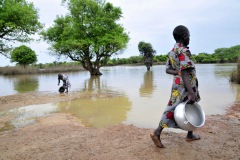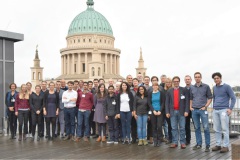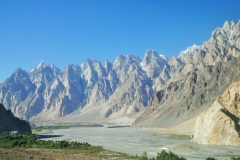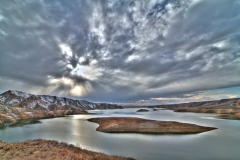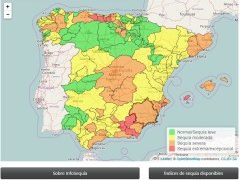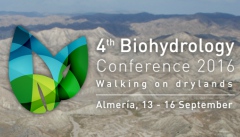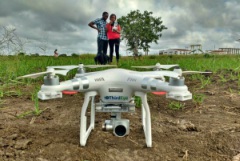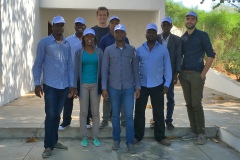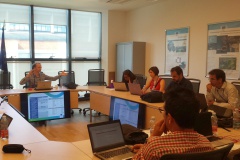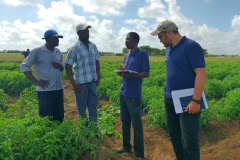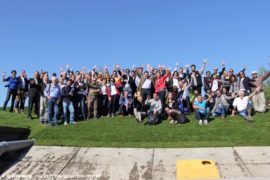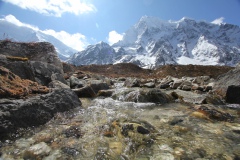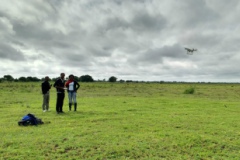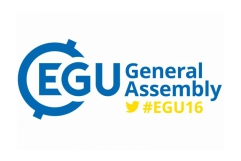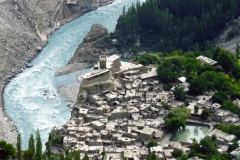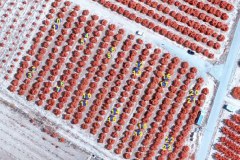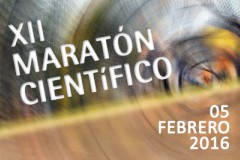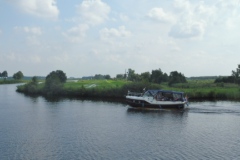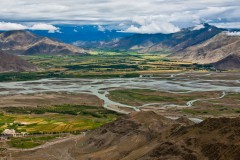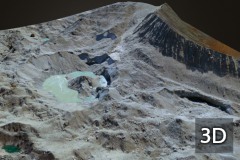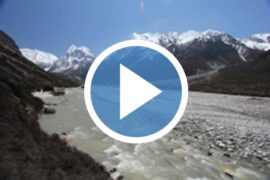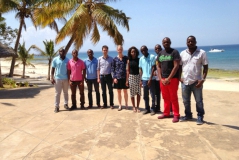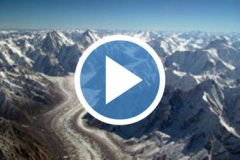News in 2016
27 December 2016
Final block of training in Water Resources Modelling for ARA-Sul and ARA-Norte
During the weeks of 21 November through 2 December, Wilco Terink and Sonu Khanal from FutureWater provided the final block of training in Water Resources Modelling to ARA-Sul and ARA-Norte in Pemba, Mozambique. This training was funded by NUFFIC’s Tailor-Made Training Programme, which is part of the Netherlands Fellowship Programmes (NFP II), and is specifically...
29 November 2016
Fruitful kick-off meeting of the System-Risk project in Potsdam
The System-Risk kick-off meeting hosted by the GFZ German Research Centre for Geosciences took place from 10-14 October in the Potsdam. The 1st day of the meeting started with presentations about challenges imposed at different levels of flood risk chain assessment by the lead scientist from each Work Package, followed by a short research plan...
10 November 2016
New publication on the impacts of climate change on the upper Indus basin
The Indus is one of the most meltwater-dependent rivers on Earth, and hosts a large, rapidly growing population and the world’s largest irrigation scheme. Understanding the hydrology of the upper Indus basin is challenging. The Hindu Kush, Karakoram and Himalayan mountain ranges are difficult to access, hampering field measurements of meteorological, glaciological and hydrological processes....
25 October 2016
IMPREX partners kick off the second project year in Crete
Text adopted from IMPREX.eu Time flies when you’re passionate is an apt saying to describe the three intense and productive days of the IMPREX General Assembly. The meeting was hosted by the project partners from the Technical University of Crete and took place from 26-28 September in the scenic landscapes of the Crete island. The...
18 October 2016
FutureWater trains national experts in Armenia on climate change, water and crops
FutureWater provides a training program to technical staff of relevant institutes and organizations in Armenia, on using simulation models for assessing vulnerability and planning of climate adaptation measures, with emphasis on water and agriculture. This week (17-Oct until 22-Oct 2016) a 1-week training is given, on using AquaCrop for assessing water-related and climate change-driven impacts...
3 October 2016
InfoSequia.es: A web-based interactive climate service for drought monitoring in the Spanish Iberian Peninsula
FutureWater redesigns the web-based platform InfoSequía.es by improving the visualization and the interactive extraction of drought information. InfoSequía.es provides weekly updates of drought severity maps, bulletins and historical series of satellite drought indices. This information aims to complement hydrological drought indices published by the Water Basin Authorities and the Spanish National Drought Observatory. Several regions...
22 September 2016
FutureWater awards two young scientists at the BioHydrology2016 International Conference
FutureWater attended the 4th Biohydrology International Conference “Walking on drylands” and awarded a prize to the best oral communication by a young scientist. For taking the end-decision, members of the Scientific Committee and of FutureWater scored all the candidates according to three main fields: Scientific relevance for the management and planning of water resources Applicability...
14 September 2016
ThirdEye presented as innovative technology in Mozambique
From August 29 to September 4 the International Trade Fair FACIM took place in Maputo, Mozambique. On this fair the Dutch Embassy organized a Holland pavilion where several Dutch organisations presented themselves to the Mozambican market. On Wednesday August 31 this pavilion was market by the FACIM WATER EVENT ‘The adaptation of innovative technologies in the Mozambican...
25 August 2016
FutureWater Co-Convenes Session at the World Water Week
The International Centre for Integrated Mountain Development (ICIMOD), FutureWater and Statkraft convene a session on Mountains, glaciers, and hydropower in a changing climate at the World Water Week, organized in Stockholm 28 August – 2 September. This session will highlight the role of mountains in providing water, food, and energy for sustainable growth using examples...
7 August 2016
First week of successful training in Water Resources Modeling for ARA-Sul and ARA-Norte, Mozambique
During the week of 11-15 July, training in Water Resources Modeling (using SPHY) was provided to ARA-Sul and ARA-Norte (water boards) in Mozambique. This training was funded by NUFFIC’s Tailor-Made Training Programme, which is part of the Netherlands Fellowship Programmes (NFP II), and is specifically meant to enhance the overall functioning of an organization by...
7 July 2016
FutureWater organizes coordination meeting for IMPREX project at EU Joint Research Centre
On 27 and 28 June, IMPREX partners working on agriculture and droughts gathered in the premises of the EU Joint Research Centre (JRC) in the Italian city of Ispra. The two-day meeting provided an opportunity to review recent progress, coordinate future actions, and to establish links with relevant activities and laboratories of the JRC. The...
5 July 2016
Identifying and designing business models for the ThirdEye project in Mozambique
How to be a commercial business, and at the same time reach out to the rural poor and enable them to increase their food production and improve their livelihoods? The key ingredient for success is getting the right business model! Agricultural Business Developer Jelle van den Akker investigated the transition of the ThirdEye project from a...
7 June 2016
FutureWater participates in the BRIGAID project kick-off meeting
During the 12th and 13th of May, the kick-off meeting of the BRIGAID project took place at the Technical University of Delft (Netherlands). This EU-Horizon2020 project supports those innovations which aim to reduce the impacts of floods, droughts and extreme weather events. The BRIGAID’s mission is to turn already existing prototypes into market-ready products. This...
25 May 2016
PhD research: More water in Asian rivers due to climate change
Text adopted from Utrecht University On Friday 27 May Arthur Lutz defends his PhD thesis, which is the result of a joint PhD project by FutureWater and Utrecht University. He concludes that climate change will lead to more rainfall and meltwater, thus leading to more water in Asian rivers. More than one billion Most large rivers...
29 April 2016
ThirdEye: Training new Flying Sensor operators in Mozambique
A key factor in enabling an increase and efficiency in food production is providing farmers with relevant information. Such information is needed as farmers have limited resources (seed, water, fertilizer, pesticides, human power) and are always in doubt in which location and when they should supply these resources. Interesting is that especially smallholders, with their...
28 April 2016
FutureWater contributes to the EGU General Assembly 2016
Results of several ongoing projects of FutureWater were being disseminated among a large group of scientists last week during the General Assembly 2016 of the European Geosciences Union (EGU). The EGU General Assembly was held at the Austria Center Vienna (ACV) in Vienna, Austria, from 17 to 22 April 2016. It is the largest conference on the...
13 April 2016
PhD position: Development of Future Weather techniques for flood risk assessment
We are delighted that you consider joining the ETN System-Risk as an Early Stage Research (ESR) fellow. System-Risk is a Marie-Skłodowska-Curie European Training Network which aims on developing and implementing a systems approach for large-scale flood risk assessment and management and provides a framework for training and career development of 15 Early Stage Researchers (ESRs). The network brings...
29 February 2016
FutureWater presents at conference on Climate Change Impacts for Indus Basin Waters
An International Conference on Climate and Environmental Change Impacts on the Indus Basin Waters was organized jointly by ICIMOD, The World Bank Group and the International Water Management Institute from 16 to 19 February 2016 in Kathmandu, Nepal. The Indus River Basin is shared by four countries Afghanistan, China, India, and Pakistan. The Indus Basin...
22 February 2016
FutureWater receives award for the best contribution on precision agriculture and flying sensors
The contribution “Spectral and physiological responses of Citrus irrigated with saline reclaimed water combined with deficit irrigation strategies” was recently awarded as the best submission in the “Precision Agriculture” thematic panel of the 2nd Spanish Symposium of Horticultural Engineering held in Almeria between 12-16 February. The contribution was led by Cristina Romero and is the...
11 February 2016
InfoSequia at the XII Scientific Conference of the Experimental Station of Arid Zones
The drought portal InfoSequía was presented at the XII Scientific Conference organized by the Experimental Station of Arid Zones (EEZA -CSIC ) and held on 5 February on the University Campus of Almeria. During this event taking place annually since 2005, researchers and experts share their latest advances and innovations through mini-lectures. FutureWater contributed to...
28 January 2016
Innovation project ‘Dike monitoring with Flying Sensors’ completed
On Thursday the 21st of January the innovation project “Dike monitoring with Flying Sensors” was concluded with a meeting at the head office of “Wetterskip Fryslân” (the water board of Friesland). During the afternoon the results of the Dike monitoring project, which had a duration of one and a half year, were presented by FutureWater,...
20 January 2016
New approach to select climate models for impact studies
Climate change impact studies depend on projections of future climate provided by climate models. The selection of an ensemble of climate models is not straightforward, but defines the outcome of climate change impact studies to a large extent. A new approach to select representative climate models was developed by FutureWater in collaboration with Alterra Wageningen...
18 January 2016
FutureWater develops 3D model of Langtang glacier in Nepal
FutureWater developed a 3D model of the Langtang glacier in Nepal, made using our UAV data. The model can also be viewed in 3D by using Google Cardboard.
12 January 2016
Documentary on climate change in the Himalayas
The Himalayas and adjacent mountain ranges are an important source of water for more than 25% of the global population. However, it is unknown how much snow and rain falls in those vast mountain ranges, because of the lack of observations and the inaccessibility of the terrain. Understanding how much water is available in the...
7 January 2016
Training weeks on water resources and water allocation modelling for ARAs in Pemba, Mozambique
In order to have a stronger advisory role towards policy and decision makers and people living in their management areas, three ARAs (water boards) of Mozambique require knowledge on how-to use and apply Water Resources and Water Allocation Models. Because the ARAs were facing a knowledge constraint on these topics, they requested a Tailor-Made Training...
4 January 2016
Webinar on the Asian Water Towers and Climate Change
The high mountain ranges in Asia are also called the Asian Water Towers, providing water resources for the densely populated downstream areas, where millions of people depend on the water coming from upstream. The water generated in the high Asian mountains feeds into the world’s largest irrigation schemes and reservoirs. Downstream water demands are high,...
